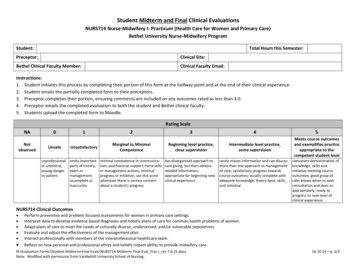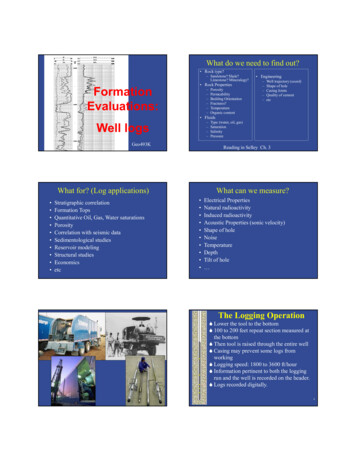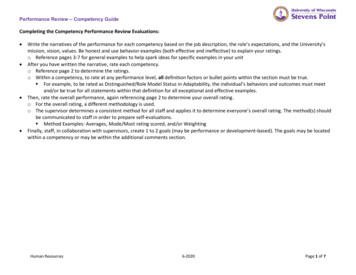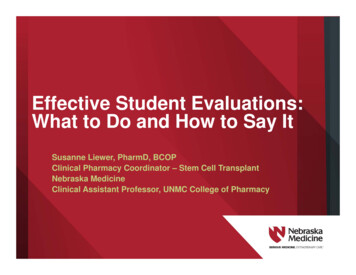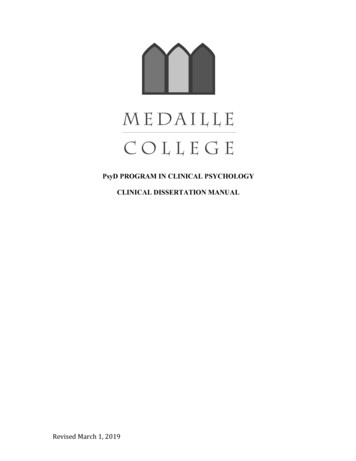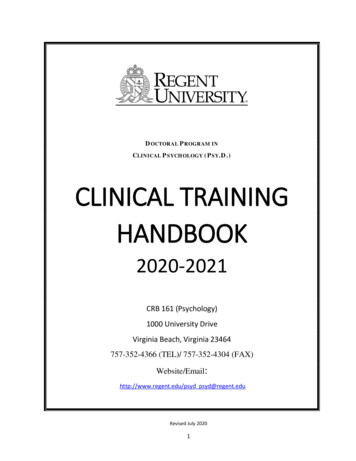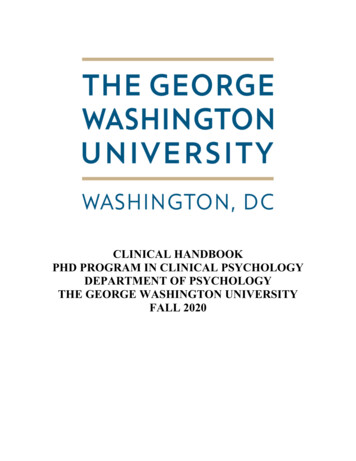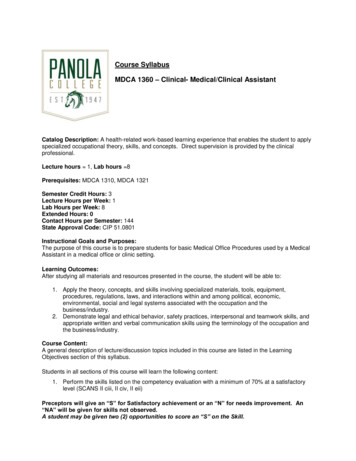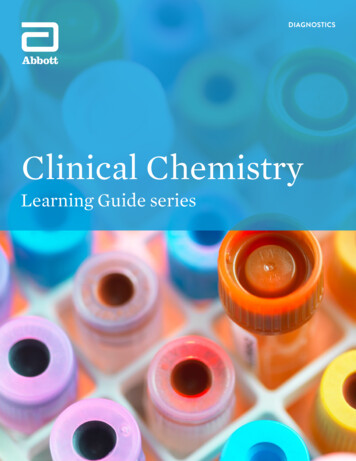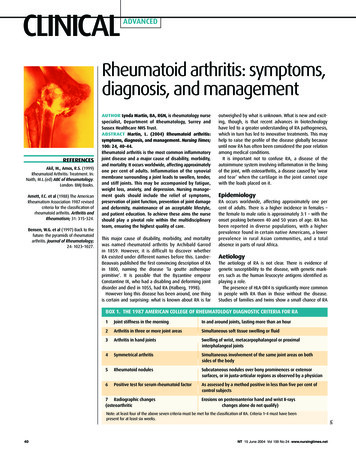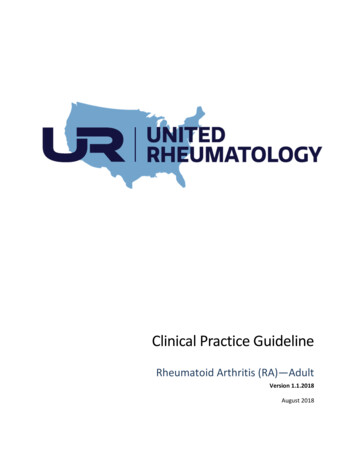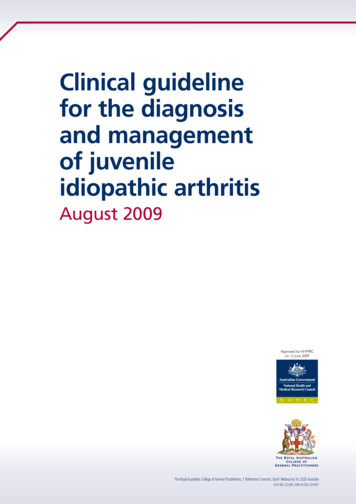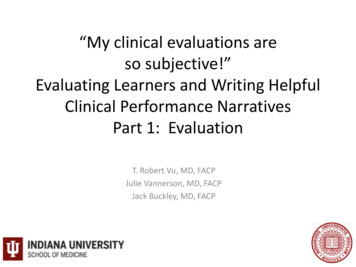
Transcription
“My clinical evaluations areso subjective!”Evaluating Learners and Writing HelpfulClinical Performance NarrativesPart 1: EvaluationT. Robert Vu, MD, FACPJulie Vannerson, MD, FACPJack Buckley, MD, FACP
COI Disclosures None to report
Sample narrative commentsThese are real!! “Pleasant to work with. Enthusiastic. Hard worker. Will makea great doctor. Needs to read more.” “Great team player. Wonderful bedside manner. Goodknowledge base. Asked good questions.” “Functioning at the level of a seasoned intern.” [description ofan early MS3] “Has a nice smile.” “Nice student. Got along well with patients and nursing staff.Good sense of humor. Well-groomed and attired. Will dowell.”
Session Objectives Identify key components of teaching cycle that enableteachers to write informative evaluations Define evaluation– Distinguish types: Formative vs. summative Verb vs. noun Describe methods to evaluate trainees in the clinicalsetting Review a synthetic approach to evaluation of learners Q&A to discuss barriers to evaluation process
Our goals for you to become morediscerning and descriptive
Your Roles as Clinical Teacher Teacher: disseminator of knowledge and afacilitator of learning “Teaching is always occurringwhenever there is learning taking place.”Kelley Skeff, MD, PhD– Learning climate– Communication of goals– Supervisor: Evaluation & Feedback
Teaching CycleLearning ClimateFeedbackCommunication ofGoalsEvaluation
Communication of Goals An essential precursor to evaluation Definition– Establishment & explicit expression of teacher’sand/or learner’s expectations for the learner(s) Purpose– Let learners know what to master– Guide teacher in planning instructional process– Provide learners & teacher with basis forevaluation/assessment8
Importance of goals
Communication of s, EPA’s
Communication of Goals Types: Ends goals Means goals Timing (can occur before, during, after) Key components Establishment of Goals define Expression of Goals say/write it Collaboration on Goals check in with learners
Evaluation Definition:– The process by which the teacher assesses thelearners’ knowledge, skills, attitudes, competencies,milestones, etc. based on criteria related toeducational goals Purpose:– allows teacher to gauge academic progress (i.e.,“know where the learner is”) thereby (1) guidesteacher to provide feedback for improvement, and (2)gives teacher a means for assessing effectiveness ofprevious teaching in accomplishing stated goals
Teaching CycleLearning ClimateFeedbackCommunicationof GoalsEvaluation
EvaluationTEACHERLEARNERCONTENT
Weakest link vs. compensatory model
Evaluation Types Summative final assessment of learner’s performance at theend of a learning experience (course, clerkship, rotation, etc.) Formative occurs throughout teaching/learning process toassess learner’s progress towards educational goals Verb assessing learner’s performance Noun assessment form to fill out (AKA summative writtenfeedback) Key components Observation of learnersQuestioningAssessing self-assessment
EvaluationKey components & specific behaviors1. Observation of learnersTeaching behavior: Observe learner’s performance Direct observation of skills (communication,procedural, etc.) Read their notes & orders Listen to their presentations
EvaluationKey components & specific behaviors2. Questioninga. Forms of questions- Open-ended questions- Closed-ended questionsb. Wait time
Evaluation2. QuestioningTeaching behavior: Ask questions to assess knowledgeTYPESLEVELSFundamentalAppliedof cognitive l infoApply recalled info tocase or clinical scenarioAnalysis/SynthesisDemonstrate highercognitive processingApply analyzed/synthesizedinfo to case or clinicalscenario
EvaluationExamples of questions for entalApplied“What are the major causesof renal failure?”“What is this patient’sHgb?”“How would you contrastthe etiologies of renalfailure?”“What is your diagnosticplan for this patient?”
Evaluation2. QuestioningTeaching behavior: Ask questions to assess skillsLevelsExamplesof complexitySimple“Can you show me how topercuss the abdomen?”Complex“Can you demonstrateplacing a central line?”
Evaluation2. QuestioningTeaching behavior: Ask questions to assess attitudesExamples“What behaviors do you feel are important for showing collegialrespect?”“What factors are influencing your choice of medical specialty?”“How are your feelings about patients with prescription opioiddependency affecting your care for this patient?”
Evaluation3. Assessing self-assessmentTeaching behavior: Ask learner to self-assess and evaluate their S-A skillsTTLCCTeacher asks“How well do youthink you did?” and watchesLearner look inmirror.
Evaluation3. Assessing self-assessmentTeaching behavior: Ask learner to self-assessExamplesFundamental Recall K:“How would you assess your knowledge of themajor precipitating causes of hepaticencephalopathy?”Applied Analysis/Synth K: “Do you think your knowledge base is adequate totake care of this patient?”Skill:“Are you comfortable with your skill in placing anarterial line?”Attitude:“How would you assess the level of respect youshowed to the patient we just saw?”
Recap: Evaluation opportunitiesLT- Observes/listens/reads- Questions KnowledgeC Skills Attitudes Competencies/milestones Self-assessment
From nuts & bolts toputting it all together (literally) the dreaded (or #% @&!) evaluation formand narrative comments!!!
Evaluation of Clinical Trainees Analytic vs. Synthetic approaches– Analytic: traditional method; “analyzes”, or “breaks up”learner’s performance into several components (knowledge,skills, & attitudes).– Synthetic: “puts things together” asks how the learner’sabilities in several domains come together to achieve a levelof proficiency. Developmental in nature. Medical students are transitioning from preclinical status to internship a developmentalaspect is more useful in framing an evaluationsystem.
Advantage of a synthetic approach
RIME framework Vocabulary for synthetic evaluation of students’knowledge, clinical skills, & professionalism Describes development in clinical skills from “Reporter”to “Interpreter” to “Manager/Educator” (RIME)– Each level requires all three facets of the analyticmodel (knowledge, skills, and attitude) Definition by Dr. Edmund Pellegrino: professionalism is apromise of duty and a promise of expertise.– Developmental approach– Descriptive evaluation (NOT “subjective”): criterionbased for each level– Aligns well with the SOAP sequence (and USMLEstep 2 & 3 examinations)Pangaro LN. A new vocabulary and other innovations for improving descriptive in-trainingevaluations. Acad Med 1999
RIME framework – in stagesWhat?Now what?Plan, i.e., “Manager”(USMLE Step III)S O data problem list,i.e., “Reporter”So what?How & why?Assessment,i.e.,“Interpreter”(USMLE Step II)S O A P
Developmental nature of RIMEStevens MB, Gimbel RW, Pangaro L. Acad Med. Jan 2011;86:11-14.
Questions? Barriers to evaluation?
“My clinical evaluations are so subjective!” Evaluating Learners and Writing Helpful Clinical Perform
